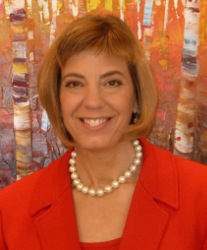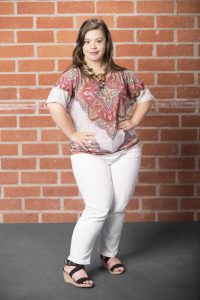The Emmys: Seeing Hispanics in Hollywood
Posted by Elena del Valle on August 29, 2016
By Jennifer Laszlo Mizrahi*
President, respectabilityusa.org

Jennifer Laszlo Mizrahi, president, respectabilityusa.org
For the first time in history, a TV show staring people with disabilities has been nominated for an Emmy Award– and one of the stars, Cristina, is Hispanic! The glass ceiling-breaking show is Born This Way, A&E Network’s critically acclaimed and award-winning original docuseries which airs Tuesdays at 10 p.m. EST. Born This Way was nominated for Outstanding Unstructured Reality Program. In addition, two episodes were nominated for Outstanding Picture Editing for an Unstructured Reality Program.
The show documents real life as Cristina and her fiancée Angel continue to look forward to their wedding, but have a lot of life skills to master before they are ready to live on their own. Produced by Bunim/Murray Productions, the series follows a group of seven young adults with Down syndrome along with their family and friends in Southern California. Recently, the series was chosen as one of six honorees for the 2016 Television Academy Honors, an award that recognizes television programming that inspires, informs and motivates. That was a wonderful award. However, the Emmys also really matter. Until now, no series starring people with disabilities of any background has ever been nominated for an Emmy Award — and Born This Way includes positive images of Hispanic Americans. We know that actress Michelle Rodriguez has ADD (attention deficit disorder) and superstar Selma Hayek has dyslexia. It is really important when people with disabilities can be seen by the abilities they have.
Born This Way tears down barriers in many ways. Not only does it star people with disabilities, those individuals are diverse. In addition to the fact that Christina is a Hispanic woman, Elena’s mother is from Japan and they show the immigrant experience. John is African American. This is important for several reasons. One is that when disability is depicted in culture, it tends to be all white. Real story telling requires exploring people with multiple minority status (i.e. Hispanic with a disability). Secondly, far too many Hispanics and African Americans in America who have a developmental disability are not getting the diagnosis, school accommodations and high expectations they need to succeed. Only 61 percent of students with disabilities receive a high school diploma. Also, there are currently 750,000 people with disabilities behind bars in America – and the majority of them are people of color, as we noted in our report.

Cristina stars in Born This Way
The individuals who star in the Emmy-nominated show and their families are models of how disability can and should be accepted and addressed in minority communities. It seems almost impossible that it has taken until 2016 for such a thing to happen. After all, one-in-five Americans has a disability. But according to GLAAD, which tracks minority representation in scripted programs, only one percent of characters we see on TV have disabilities. Moreover, the Ruderman Family Foundation just released a major white paper which found that more than 95 percent of those all too few characters with disabilities that actually are on television are played by actors without disabilities. This lack of self-representation points to a systemic problem of ableism—discrimination against people with disabilities—in the television industry. It also points to a pervasive stigma among audience members against people with disabilities given that there is no widespread outcry against this practice.
Thousands of people through the Television Academy get to vote on the Emmy Awards. We urge them to screen Born This Way and then vote for it, not for affirmative action reasons, but because it is a beautifully crafted show with themes that resonate for all of us, disability or not.
This is nothing short of a social justice issue where a marginalized group of people is not given the right to self-representation. We must change this inequality through more inclusive shows and casting, through the media holding the industry responsible, through the avoidance of stereotypical stories, and ultimately through the telling of stories that depict people with disabilities without focusing only on the disability. Born This Way, in starring people with disabilities, hits all the marks while also being a fun and fabulous show. It deserves the votes of people today!
One of the great things about the show is that is demonstrates that people with disabilities want jobs and can be really great at them. Many of the cast members are working productively and successfully. For employers the 22 million working age people with disabilities in America, according to the US Census, can be a great talent pool. This is especially true because each year 300,000 young people with disabilities – have big dreams like the real people in the show – enter what they hope will be the workforce. However, due to unfair stigmas, only one in three working age people with disabilities has a job, according to the US Census. For people who are Hispanic and have a disability, it is very helpful to have wonderful role models like Cristina.
Jennifer Laszlo Mizrahi has a disability and knows what it means to parent a child with multiple disabilities. You can reach her at JenniferM@RespectAbilityUSA.org.
* Photos: Victor Mizrahi









